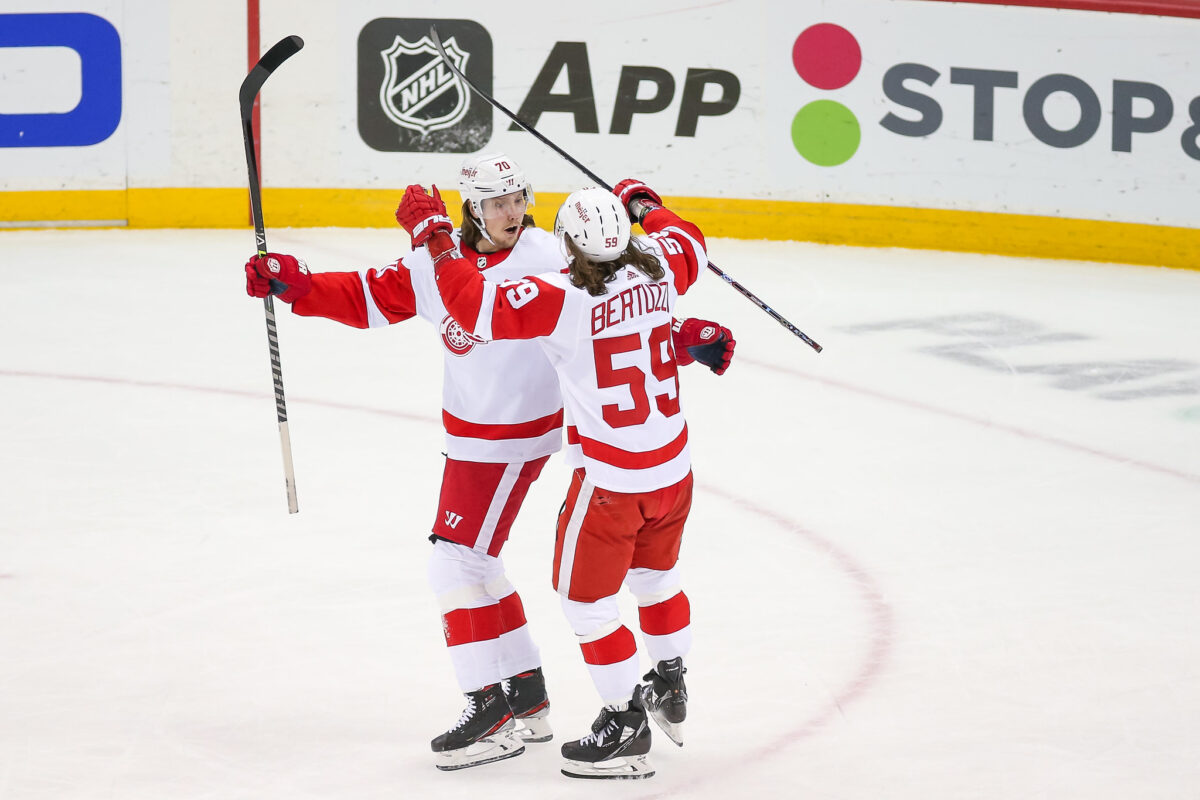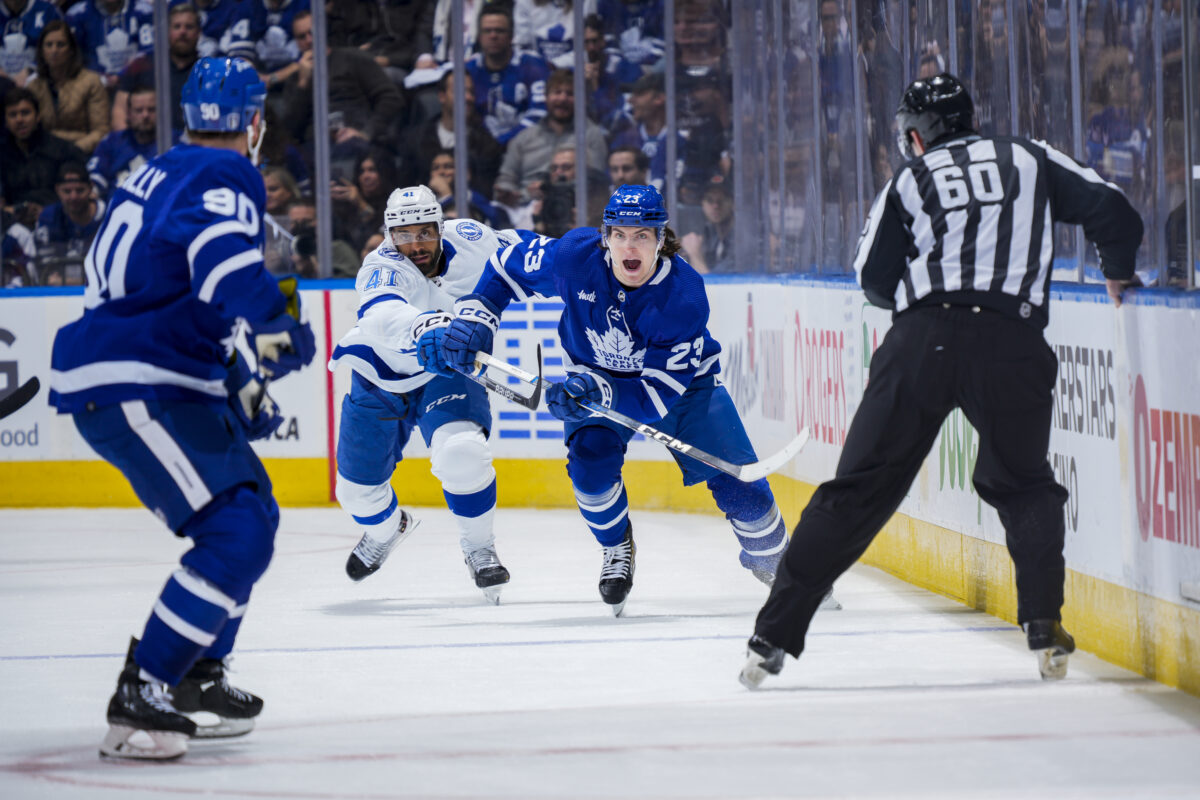Toronto Maple Leafs fans are just over three weeks away from the opening of training camp and seven weeks away from the Maple Leafs’ opening game of the 2023-24 season. There is still lots of time for the team to make player personnel changes between now and then. We would be very surprised if there were not some changes to the roster between now and Oct. 11, when the Maple Leafs play their home and season opener versus the Montreal Canadiens.
But, what if there aren’t any changes? What if the Maple Leafs were to start the season with the roster as it exists today? What if we compared the present roster to the team the Maple Leafs iced in their season opener last season, a game in which they lost 4-3 to the Canadiens in Montreal? Would this roster be better or worse?
Looking at Players Who Started the 2022-23 Season and Their Replacements
First, let’s look at the players who were on that opening-game roster but are no longer with the Maple Leafs. Those players include forwards Zach Aston-Reese, Nicholas Aube-Kubel, Michael Bunting, Pierre Engvall, Alex Kerfoot, and Denis Malgin. In addition, defensemen Justin Holl and Rasmus Sandin have departed.

Now let’s look at the players who have replaced them. These players include forwards Tyler Bertuzzi, Max Domi, Sam Lafferty, Matthew Knies, Ryan Reaves, and Dylan Gambrell. In addition, two new defensive players are Jake McCabe and John Klingberg.
Comparing These Players
There are a number of ways we can compare these players. However, for the purpose of this post, we are going to look at past production of the players as a group both last season and for their careers.
2022-23 Season Production for Departed and Incoming Players
The Departed Players
| Games Played | Goals | Assists | Points | Plus/Minus |
| 460 | 63 | 95 | 158 | Plus-48 |
The Incoming Players
| Games Played | Goals | Assists | Points | Plus/Minus |
| 479 | 62 | 135 | 197 | Minus-49 |
Using their production from last season as a comparison, the eight new players scored one fewer goal but recorded 40 more assists. This is a total of 39 more points in 19 more games played. If we broke that down to a “per game” basis, they would have pretty much equal goal production. However, the new players would have slightly better assist and point production.
Related: 2000 NHL Draft: 21 Goalies Selected Before Henrik Lundqvist
The biggest difference would seem to be in the plus/minus rating. The departed players have a collective plus-48 rating compared with the incoming players’ minus-49 rating.
We do have to note here that the production and plus/minus of the departing players would have been strongly influenced by playing on one of the strongest regular season teams in the league with one of the best core players in the league as well. While the other players played alongside some good players, the overall caliber and talent level of those teams would not compare to the Maple Leafs.

(Jess Starr/The Hockey Writers)
Having said that, using last season’s stats, the overall offensive talent of the incoming players should be considered better than the departed players. What does come into question is their defensive abilities. There’s almost a 100-point swing in plus/minus between the two groups.
Looking at the Players’ Career Plus/Minus Ratings
Departed Players
| Games Played | Goals | Assists | Points | Plus/Minus |
| 2,103 | 310 | 495 | 805 | Plus-182 |
Incoming Players
| Games Played | Goals | Assists | Points | Plus/Minus |
| 3,304 | 418 | 930 | 1,348 | Minus-216 |
We can see there’s a huge discrepancy in the total number of games played between the groups. That of course would mean the incoming group has more experience than the departed players. Surprisingly there is only one year difference in the age of the two groups. The new group is on average one year older than the players who have left (28 years old compared to 27). The new group does have a wider range of ages with Reaves the oldest at 36 and Knies the youngest at 21. Of the departed players, Holl was the oldest at 31 and Sandin the youngest at 23.
Breaking the Overall Statistics into 82-Game Blocks
With 1,201 games played difference between the two groups, we decided to break the statistics into 82-game blocks so we can have a better comparison.
Departed Players
| 82 Games | Goals | Assists | Points | Plus/Minus |
| Per Player | 12 | 19 | 31 | Plus-7 |
| As a Group | 96 | 152 | 248 | Plus-56 |
Incoming Players
| 82 Games | Goals | Assists | Points | Plus/Minus |
| Per Player | 10 | 23 | 33 | Minus-5 |
| As a Group | 80 | 184 | 264 | Minus-40 |
Using this breakdown as a gauge, if all eight players of each group were to play all 82 games we would expect the new group to score 16 fewer goals but 16 more points. Again the biggest difference would be in plus/minus, where we would see a repeat of the almost 100-point difference (minus-40 compared to plus-56).
Related: Remembering Maple Leafs Tough Guy Jim Dorey
Using career stats as a predictor, the offense between the two groups would be nearly the same. There would be fewer goals from the new group counterbalanced with more assists. The same questions about the new group’s defensive abilities remain.
Knies Is a Wild Card and Intangibles
There is one wild card in the mix with the new group. That’s Knies. He’s pretty much a blank slate. However, from what he showed in the few games he played last season in both the regular season and playoffs, he does have the potential to score 20 goals and 40 points as a rookie.

Of course, that would depend upon whether Knies can play the whole season and get time alongside the core four of the Maple Leafs. If he’s relegated to a bottom-six role, his production could still be in the 10-goal and 20-point range. Either way, that still adds to the offensive production totals for the incoming group.
As for the intangibles, the new group does appear to be more aggressive and physical than the departed players. We didn’t include Wayne Simmonds in the departed group because he was a healthy scratch in the first game last season. Reaves appears to not only be a suitable replacement for Simmonds but also a player who, if he doesn’t have a drop-off due to his age, should be able to play more minutes than Simmonds played last season.
Related: Maple Leafs Are Suffering The Curse of Harold Ballard
One other thing to note is that this is a regular season comparison, and does not include playoff performances. The Maple Leafs made changes to half their on-ice lineup at the trade deadline last season. The same thing could happen this season. The immediate concern for this team is their performance in the upcoming regular season. The playoffs are a long way off.
The Bottom Line
If Knies plays to his potential and players like Bertuzzi and Domi benefit from playing alongside Auston Matthews, Mitch Marner, John Tavares, and William Nylander, the incoming players as a group have the potential to be more potent offensively than the departed players. At worst, they should be marginally better offensively.
Defense is a different story. This is where the biggest questions and doubts lie. Can the new group play to their offensive potential but also be more responsible defensively?

(Amy Irvin / The Hockey Writers)
As we mentioned earlier, we don’t know if this will be the lineup when the puck drops at Scotiabank Arena on Oct. 11. If we can believe the rumors, we might potentially see a breakup of the Core Four. The defense could also look drastically different.
However, if there are no trades or injuries in training camp, the Maple Leafs will at the very least have to make some kind of move to get under the salary cap.
We will have to see how things play out.
[Note: I want to thank long-time Maple Leafs’ fan Stan Smith for collaborating with me on this post. Stan’s Facebook profile can be found here.]
